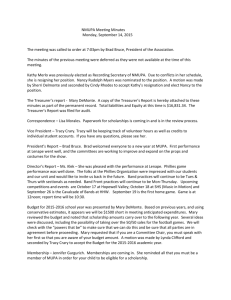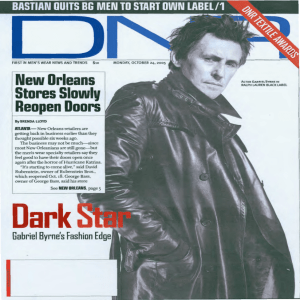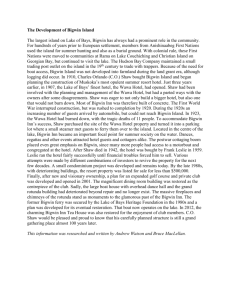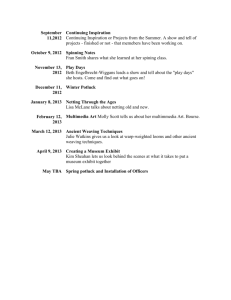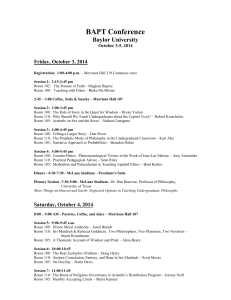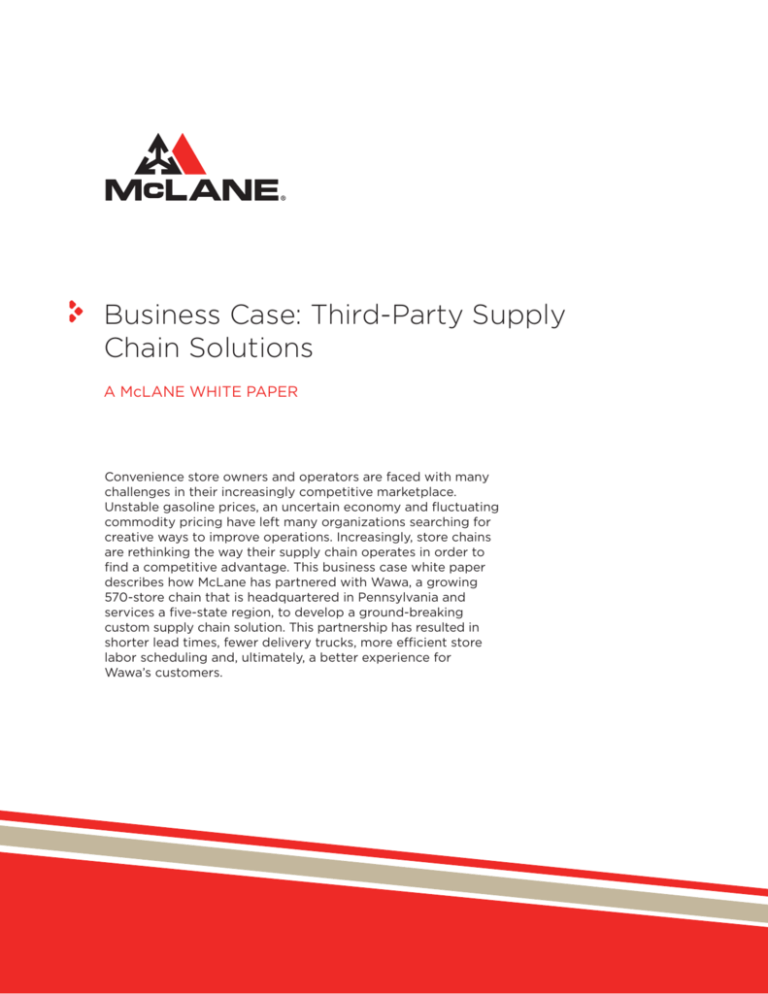
Business Case: Third-Party Supply
Chain Solutions
A McLANE WHITE PAPER
Convenience store owners and operators are faced with many
challenges in their increasingly competitive marketplace.
Unstable gasoline prices, an uncertain economy and fluctuating
commodity pricing have left many organizations searching for
creative ways to improve operations. Increasingly, store chains
are rethinking the way their supply chain operates in order to
find a competitive advantage. This business case white paper
describes how McLane has partnered with Wawa, a growing
570-store chain that is headquartered in Pennsylvania and
services a five-state region, to develop a ground-breaking
custom supply chain solution. This partnership has resulted in
shorter lead times, fewer delivery trucks, more efficient store
labor scheduling and, ultimately, a better experience for
Wawa’s customers.
INTRODUCTION
In the hyper-competitive convenience store business, differentiation is all about
the little things. One company that does the little things necessary to develop—
and maintain—a unique identity is Wawa, a dynamic, Pennsylvania-based
570-store chain with locations throughout New Jersey, Pennsylvania, Virginia,
Maryland and Delaware.
Their core purpose is “to simplify our customers’
daily lives.” They do so by providing a large fresh
food selection and award-winning, freshly brewed
coffee in stores designed to build long-term
relationships with their customers.
From their early days delivering dairy products doorto-door, to the founding of their first food store in
1964, to the addition of gasoline sales at many of their
locations in 1996, Wawa’s corporate initiatives have
been driven by customer demand. But with organic
growth came a complex, disjointed supply chain.
Soon, they were faced with delivery challenges and
the potential for poor customer experiences.
Wawa has always been willing to adapt to changing
conditions. Change, in this case, meant partnering
with an industry-leading supply chain vendor to
consolidate their own supply chain. The result?
A custom-built supply chain solution that has resulted
in fresher food at their stores, fewer out-of-stocks
and increased demand—all while protecting their
profit margins.
FINDING THE SOLUTION
Wawa’s distribution challenge was similar
to that of many convenience stores:
Adding new products or new product
categories frequently meant additional
vendor trucks stopping at each location.
In some cases, their stores would see 15–20 delivery
trucks in a day. Many deliveries occurred at peak
customer times, exacerbating the problem. Coupled
with difficulties some vendors had in keeping Wawa’s
shelves stocked, it was evident that the system was
already beyond its practical capacity.
In 1999, Wawa set out to reinvent their supply
chain. Willingness to change to address market
conditions has always been a hallmark of the Wawa
organization—in fact, “embrace change” is one of the
company’s core values. But for Wawa, change is not
whimsical. It is carefully considered, based on clearly
defined goals. In this case, the goal was a distribution
system designed around the needs of each store, and
ultimately Wawa’s customers. Wawa recognized the
inherent challenges in the process, having studied
the efforts of other companies to establish their own
in-house distribution facilities. Wawa knew that they
needed a supply chain partner with expertise and
ample capital resources in order to make the project
a success.
There was a lot to consider. Unlike many convenience
stores, Wawa’s focus on fresh food meant that
their distribution solution needed to resemble a
restaurant supply chain, with multiple temperature
zones for product in the warehouse as well as on
the trucks. The solution had to be able to handle the
combination of prepared food items, supplies and
cigarettes, which are cross-docked and loaded with
warehoused merchandise for delivery. Wawa also
required that beverages arrive at the store pre-cooled
and ready to drink. This meant that large portions
of the supply chain—including storage, loading and
delivery trucks—had to be maintained at 34 degrees
Fahrenheit.
The size of the Wawa stores (often lacking back-room
space) meant that delivery schedules would have to
be precisely coordinated and flexible to ensure stores
had neither too much nor too little inventory. Some
stores would receive up to six deliveries per week
during peak seasons, while smaller stores might get
only three deliveries per week. They needed a system
that could adjust to seasonal demand changes. And
they needed a facility that could operate seven days
per week, 365 days per year.
Wawa’s requirements demanded a custom solution.
To maintain 100% tracking and visibility, they required
that all products be scanned during loading as well
as at delivery. Wawa’s need for a highly customized
solution meant that they required more than a
vendor—they needed a partner. Wawa found that
partner in McLane, one of the largest supply chain
providers in the United States. McLane brought
extensive experience, a reputation for dependability
and consistency, and the comfort of a debt-free,
well-established company. McLane’s vast distribution
network provided infrastructure redundancy in the
event of problems. In McLane, Wawa found a true
partner willing to roll up their sleeves and tackle the
complexities of the problem head-on.
In order to scope the program, McLane and Wawa
relied on experts from within their respective
organizations as well as the distribution logistics
consultants who had been hired to help select the
partner. Wawa and McLane were both willing to invest
the time required and didn’t rush to an expedient
answer. The facility design, systems, automation and
construction were all managed by McLane resource
experts with input from Wawa and the vendors
responsible for building the various components.
McLane began working with Wawa in 2002. Both
Wawa and McLane were committed to building the
right solution at the highest levels of their respective
organizations. Not being a franchise model, Wawa
had the luxury of building the solution for all their
stores and ensuring that it would be implemented
across the board. With that level of focus and
attention, it was only a matter of time before a
working model could be defined that would take into
account all of Wawa’s needs. By early 2003, they had
a defined scope of work.
The solution was to build a custom distribution
center in New Jersey—convenient to all of Wawa’s
stores, as well as key Wawa suppliers. McLane would
build, own and run the facility on behalf of Wawa and
manage the logistics of distribution to the 570+ Wawa
stores. The proposed solution was ideal for Wawa: it
provided all the advantages of a dedicated facility, but
it was owned and run by a third party.
BUILDING THE SOLUTION
Construction began in September 2003
and was completed in March 2004.
Outbound operations began one month
later, in May 2004.
The New Jersey Distribution Center is a prime
example of a modern facility. The building covers
220,000 square feet and was designed to
accommodate expansion of up to an additional
50 percent. The distribution center is divided into
five distinct temperature zones, from ambienttemperature areas for paper and dry goods to freezer
zones kept at minus 10 degrees Fahrenheit. Cold
chain integrity is maintained with cool docks that
are kept at a constant 34–38 degrees. Roller-bearing
conveyors and forklifts efficiently move product
from storage to the docks, and a staff of 410 McLane
teammates coordinates the delivery efforts.
Getting product to the stores is no less customized.
McLane took advantage of their relationship with
trailer suppliers to commission 70 custom-built multitemperature trailers. Product is delivered and placed
in pre-defined locations in each store. The trucks
are manned by 114 McLane drivers who ensure that
products arrive on time.
But implementing a solution of this magnitude
requires more than a willing vendor. Wawa needed a
commitment from their associates at the store level.
Wawa’s store general managers—among the most
tenured in the industry—are critical to their operation.
They represent Wawa’s direct connection to their
customers, and they needed to feel a part of the
solution. Wawa spent the year prior to the roll out
preparing their store general managers to ensure
that the transition happened smoothly.
Streamlined delivery was critical to store-level buyin. The process—designed for efficient unloading
and superior service at each store—remains largely
unchanged today. Before its arrival, store associates
cone off a parking space (when available) for the
truck so that the driver can proceed directly to the
designated area and begin the unloading process.
Product is placed at key locations throughout the
store, with the majority of the cases being delivered
inside the cooler. This allows store associates to easily
stock the product after the delivery. Drivers scan each
case as it comes off the truck, and the store associate
responsible for checking in the product signs an
electronic invoice on the driver’s handheld unit at the
conclusion of the delivery.
The contract is as innovative as the infrastructure.
Both McLane and Wawa recognized that this should
not be a short-term solution. As a result, the contract
covers a 30-year period, ensuring the long-term
commitment of both parties. The compensation
package is performance based, with penalties and
bonuses built in, tied to pre-defined criteria. Goals
for on-time delivery, fill rates and inventory turns
are all set higher than the industry standards. As an
incentive, if McLane can exceed these set numbers,
they can earn additional revenue from Wawa.
Conversely, if McLane cannot achieve the minimum
standard set by Wawa, they are penalized financially.
Most goals have a “neutral zone” with no incentives or
penalties for either party.
During the implementation process, McLane and
Wawa learned a great deal about each other’s
business. The ability to compromise and adjust as
circumstances dictated became apparent very early
on. So did balancing the cost of the solution with
Wawa’s needs.
LIVING THE SOLUTION
Today, after five years, Wawa is seeing
striking results from their third-party
supply chain solution.
The improved delivery frequency and accuracy has
allowed Wawa to reduce overall inventory levels while
improving service levels. Though originally scoped
for daily store delivery, most stores are on an everyother–day schedule (some stores receive additional
deliveries during the summer). McLane consistently
exceeds the goals called for in the contract. In-stock
accuracy is above 99.9%, and on-time delivery is
better than 98%. Store general managers enjoy
a great relationship with the McLane drivers and,
in the most recent store survey, gave the McLane
Distribution Center a 95.4% satisfaction level. Most
importantly, the Wawa stores and the McLane
distribution center team have developed a great
understanding and respect for each other.
But it is the little details that have really made the
solution work. Wawa had identified water and
Gatorade delivery as a customer service problem
because they were delivered to the stores at room
temperature. If a customer arrived just after the
cooler had been restocked, they weren’t going
to get a cold drink. Wawa and McLane came up
with the audacious solution of chilling water and
Gatorade at the distribution center and delivering
them cold to the stores. By eliminating the possibility
of room-temperature drinks, they increased customer
satisfaction. Additionally, because Wawa was now
cooling Gatorade in one location instead of more
than 570, it resulted in extra savings as well.
The level of collaboration continues to be strong.
Wawa maintains a small staff at the McLane facility
in New Jersey that serves as the bridge between
Wawa and McLane. This team helps ensure that each
company’s operations and merchandising groups
are aligned. By doing so, they can combine Wawa’s
familiarity with their stores and customers with
McLane’s vast experience in inventory management
to help ensure optimal inventory levels. This group
also helps to manage the relationship between the
distribution facility and the individual stores.
Ultimately, the relationship between McLane and
Wawa has grown into a true partnership. Unlike a
traditional vendor/client relationship, McLane and
Wawa are fully invested in each other’s business.
The integration of the two businesses is so tight that
it is increasingly difficult to tell who works for whom.
From the very progressive compensation schedule
(with performance-based penalties and bonuses
built in) to their approach to planning and budgeting,
McLane and Wawa operate as a unit. The exercise has
been a resounding success for both companies with
an ever-increasing level of integration.
THE FUTURE
Differentiation is about the little things, but one big thing makes
both McLane and Wawa comfortable about their ability to meet
future needs: flexibility.
It was built into the solution from the outset. Both parties have demonstrated
the willingness—and the ability—to adjust and change. The close collaboration
has moved from being a luxury to a near necessity.
An uncertain, moribund economy, unstable gas prices and other market forces
present convenience store owners with daunting challenges. Success in this
environment will hinge on the ability to adjust quickly—while continuing to do
the little things well. Thanks to their ground-breaking business relationship,
McLane and Wawa are uniquely positioned not just to survive, but to thrive.
To find out more about our third-party supply chain solutions,
call (800) 299-1401 or visit www.mclaneco.com/goto/thirdparty
©2013 McLane Company, Inc. All rights reserved.


